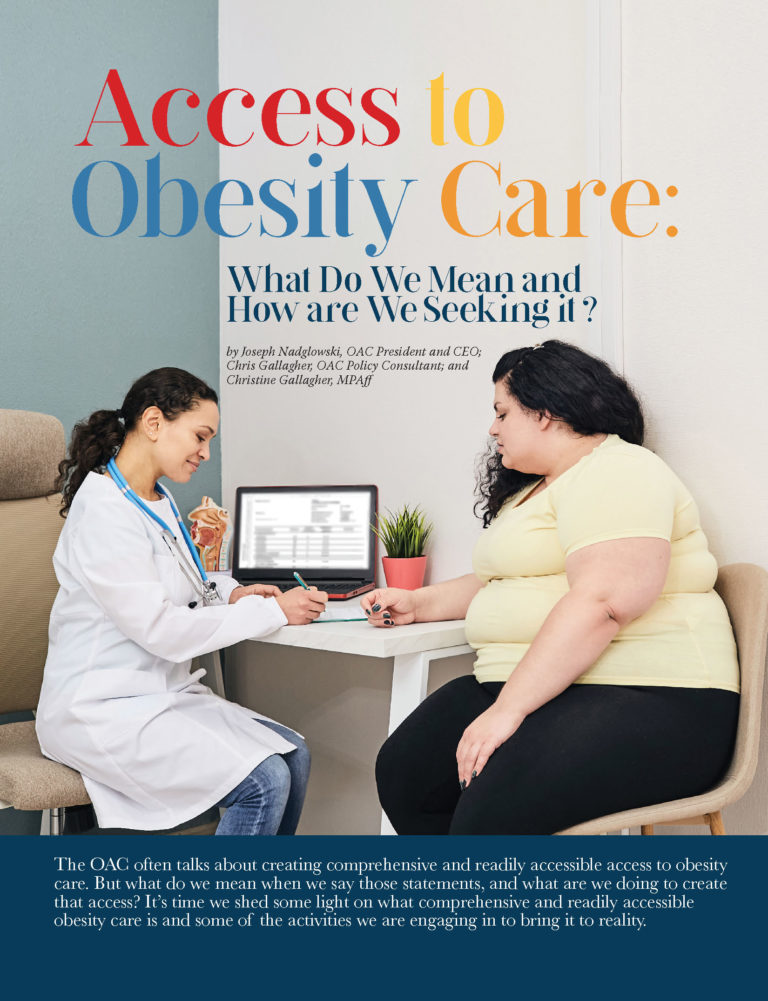Access to Obesity Care: What Do We Mean and How are We Seeking it?


by Joseph Nadglowski, OAC President and CEO; Chris Gallagher, OAC Policy Consultant; and Christine Gallagher, MPAff
Winter 2022
The OAC often talks about creating comprehensive and readily accessible access to obesity care. But what do we mean when we say those statements, and what are we doing to create that access? It’s time we shed some light on what comprehensive and readily accessible obesity care is and some of the activities we are engaging in to bring it to reality.
Defining Comprehensive Obesity Care
The impact of obesity is often highlighted in the media, and public messages about obesity often urge people to seek care. However, our current healthcare system makes it difficult to know what care is available for people affected by obesity and how much it costs. The reality is that some obesity care, if not all, is often limited or excluded from healthcare coverage.
As a first step toward normalizing the availability of obesity care across health insurance plans, the STOP (Strategies to Overcome and Prevent) Obesity Alliance, a membership organization made up of business, consumer, government, advocacy and health organizations, designed a comprehensive obesity benefit (COB).
The COB provides guidance on the core components of obesity care and the conditions under which these services and/or items should be covered. STOP’s recommended benefit design is consistent with current evidence-based treatment guidelines.
Benefits and Services of STOP’s COB:
- Identifies evidence-based obesity treatments that can support clinically significant weight-loss and health improvement among people with obesity
- Provides guidance on the appropriate amount, scope, length and delivery of obesity-related benefit offerings
- Highlights real-world examples from state employee and Medicaid plans that cover obesity treatments
- Supports efforts to standardize the scope and availability of obesity treatments that are covered across plans and systems
The COB consists of the following services:
- Screening and prevention
- Intensive behavioral therapy
- Pharmacotherapy support
- Bariatric surgery
- Weight maintenance
Screening and Prevention
All adults should be screened annually for obesity. This includes documenting height, weight, waist circumference, body mass index (BMI) and any changes in weight or health status.
Please note: While BMI is the most commonly-used tool for screening obesity, it does have its limitations. BMI is not a direct measure of body fat and does not take into consideration muscle mass, bone mass or fat distribution. Social determinants, race, ethnicity and age can modify the risk associated with a given BMI.
Intensive Behavioral Therapy (IBT)
Intensive behavioral therapy (counseling) for obesity must include a psychological component, a physical activity component and a nutrition component.
Pharmacotherapy Support
Benefits should cover short-term and long-term FDA-approved medications prescribed in conjunction with behavioral interventions.
Bariatric Surgery
The COB covers one primary procedure for someone with:
- A BMI ≥ 40
- A BMI of ≥35 with weight-related comorbidities
- A BMI of > 30 with type 2 diabetes
Bariatric surgery procedures should be performed by a bariatric surgeon in a designated bariatric Center of Excellence (COE). The plan should cover at least one revisional procedure to correct complications or when the expected weight-loss/health benefits are not achieved, despite sticking to a post-op treatment plan.
Weight Maintenance
Strategies to prevent weight regain are necessary to the success of the obesity care plan. Benefits should include monitoring, prevention, follow-up and intervention for relapse.
Reminding insurers that obesity is a chronic and often relapsing disease requiring multiple approaches is key to our efforts to improve access to care.
Creating Access to Comprehensive Obesity Care
The OAC dedicates significant time, effort and resources to expanding access to obesity care. Our philosophy is simple: if you wake up this morning and decide you are ready to address your obesity, we believe it should not only be easy to seek help from your healthcare provider or evidence-based community program, but that such help should be covered by your insurance without hoops, hurdles or other barriers to such care.
As an organization, you’ve likely heard us talk about our efforts with Medicare and specifically the Treat and Reduce Obesity Act (TROA). If passed, TROA would bring Medicare very close to the comprehensive benefit described by STOP. In fact, we’ve shared the STOP work with Medicare representatives. What Medicare does with policy typically influences decisions made by private insurers and employers. So, what Medicare does is important not only for our seniors and those living with a disability, but for all Americans.
Over the Years…
Providing coverage for obesity care is supported by a growing number of organizations representing key state policy stakeholders. For example, in 2015, the National Council of Insurance Legislators that represents legislators who chair insurance committees in state legislatures across the country adopted its first-ever disease-specific policy statement that urges Medicaid, state employee and state health exchange plans to update their benefit structures:
“To improve access to, and coverage of treatments for obesity such as pharmacotherapy and bariatric surgery.”
In 2018, the National Lieutenant Governors Association went on record supporting efforts to reduce obesity stigma and support access to obesity treatment options for state employees and other publicly funded healthcare programs. And late last year, the National Hispanic Caucus of State Legislators and National Black Caucus of State Legislators adopted formal policy recognizing that:
“Health inequities in communities of color have led to a disproportionate impact of COVID-19 and that states must address the high rates of obesity to improve the health of racial minorities and prepare for the next public health epidemic…..and ensure that their constituents, including those using Medicaid, have access to the full continuum of treatment options for obesity.”
The obesity community’s efforts channeled these calls for policy change into victories at the state level for expanding obesity care coverage. For example, New Mexico and Minnesota have adopted obesity drug coverage in their state health exchange essential health benefits benchmark plan and state Medicaid program, respectively. At the time of this writing, Pennsylvania was close to adding drug coverage for its citizens on Medicaid. Other states have adopted bariatric surgery coverage for their state employees such as Wisconsin, Georgia and Louisiana. We are hopeful that this will be the first step toward covering all obesity treatment avenues in these states. Finally, we continue to educate state medical boards, such as in Ohio and Florida, to eliminate dated and discriminatory prescribing practices surrounding obesity drugs.
We Will Continue to Fight!
As you can see, much work is being done but there is so much more to do. We are hopeful that if Medicare makes our suggested changes, we’ll begin to quickly see improved access to comprehensive obesity care. However, until then, this is a state-by-state, insurer-by-insurer and employer-by-employer fight for better care. OAC and our partners will continue this fight until all who want care for obesity have access to it.
About the Authors:
Joseph Nadglowski is President & CEO of the Obesity Action Coalition (OAC). A frequent speaker and author on the importance of obesity awareness, Mr. Nadglowski has more than 25 years of experience working in patient advocacy, public policy and education. He is a graduate of the University of Florida.
Chris Gallagher is the OAC’s Policy Consultant and also serves on the Access to Care Committee. He has more than 30 years of legislative and lobbying experience where he has specialized in healthcare, tax and education issues. He currently manages several healthcare issues while working with different organizations.
Christine Gallagher, MPAff, is the Research Project Director of the STOP Obesity Alliance at George Washington University’s Milken Institute School of Public Health.
by Paul Davidson, PhD; Sunil Daniel, MD, FTOS, FOMA; and Sarah Bramblette, MSHL Spring 2024 This section…
Read Articleby Kelli Richardson, RD You’ve probably heard the generic advice before: Eat your fruits and veggies. Limit…
Read Articleby Allen F. Browne, MD, FACS, FAAP, FOMA Summer 2023 “It’s not your fault!” These four words…
Read Article








